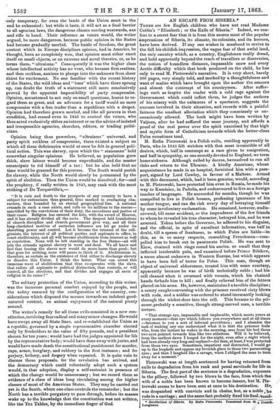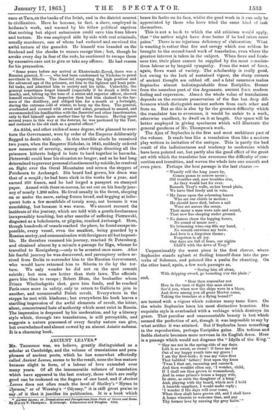AN ESCAPE FROM SIBERIA.*
THERE are few English children who have not read Madame
Cottin's " Elizabeth ; or the Exile of Siberia." Indeed, we con- fess to a secret fear that it is from this source most of the popular impressions of Siberia, its climate, its colonists, and its horrors, have been derived. If any one wishes in manhood to revive to the full his childish imrression, the vague fear of that awful land, the only country which, as a country, Englishmen really dread, and hold apparently beyond the reach of travellers or discoveries, the notion of boundless distance, impassable snow and every Arctic difficulty which that book produced on the child, he has only to read M. Pietrowski's narrative. It is very short, barely 200 pages, very simply told, and marked by a thoughtfulness and want of malice which have brought upon the author the censure and almost the contempt of his countrymen. After suffer- ings such as inspire the reader with a cold rage against the Government which could inflict them, he judges the authors of his misery with the calmness of a spectator, suggests the excuses involved in their situation, slid records with a painful fairness the smallest alleviation which they consciously or un- consciously allowed. The book might have been written by Valjean, after he had suffered the same journey, and affords a proof of the real power over the spirit exercised by that high and mystic form of Catholicism towards which the better-class Poles sometimes tend.
M. Rufin Pietrowski is a Polish exile, residing apparently in Paris, who in 1842 felt stricken with that most irresistible of all desires, which, half in contempt as a race given to emigration, and half in sympathy, as one secretly devoted to England, we term home sickness. Although exiled by decree, he resolved to run all risks and return to the Ukraine. A kindly American, whose acquaintance he made in an hospital, furnished him with a pass- port, signed by Lord Cowley, in favour of a Maltese. Armed with this document, which, had it been genuine, would, according to M. Pietrowski, have protected him even in Russia, he made his way to Kaminiec, in Podolia, and endeavoured to live as a foreign teacher of languages. He succeeded for months, though he was compelled to live in Polish houses, professing ignorance of his mother tongue, and ran the risk every day of betraying himself by some involuntary exclamation. He remained, however, undis- covered, till some accident, or the imprudence of the few friends to whom he revealed his true character, betrayed him, and he was arrested. Taken before the Governor, be adhered to his disguise, and the official, in spite of excellent information, was half in doubt, till a spasm of frankness, to which Poles are liable—in this, as in so many respects, resembling Frenchmen—com- pelled him to break out in passionate Polish. He was sent to Kiew, chained with rings round his ancles, so small that they inflicted intolerable pain, and examined before Prince Bibikov, a name almost unknown in Western Europe, but which appears to have been full of terror for Poles. This man, though an object of universal abhorrence, treated him with some courtesy, apparently because he was of birth technically noble ; had his cell cleaned when it swarmed with vermin, which his chained bands forbade him to kill ; and finally relieved him of the fetters placed on his arms. He, however, maintainei a terrible discipline; a sentry caught conversing with the prisoner received sixty blows with rods, and a soldier was ordered to stand incessantly looking through the wicket-door into the cell. This became to the pri- soner,probably a sensitive, though strong-nerved man, a terrible torture.
"That strange eye, impassable and implacable, which meets yours at every moment—that eye which follows you everywhere and at all times —becomes to you a sort of infernal providence ; and I abandon the task of making any one understand what it is that the prisoner feels who, from the instant he wakes in the morning, sees from his bed those two eyes pointed towards him like two stilettoes. Will it be believed, from the earliest dawn I longed for the night, even after a night which had been already very long and rayless?—for then, at least, I was protected from those two eyes. Sometimes, impatient and distracted, I would go up to the loophole and oppose my feverish glare to those two persecuting eyes ; and then I laughed like a savage, when I obliged the man to turn away for a moment."
Pietrowski was at length sentenced for having returned from exile to degradation from his rank and penal servitude for life in Siberia. The first part of the sentence is a degradation, exposure in the pillory, followed by two blows in the face, from which the wife of a noble has been known to become insane, but M. Pie- trowski seems to have been sent at once to his destination. He,
was despatched with convicts and in chains, but, as a noble ,lie rode in a carriage ; and the same fact probably fixed his flnalricesid..
• Recollections of Ribes*. By Beat PtetrowskL Translated from th French. Longman..
ence at Tar a, the banks of the Irtish, and in the district nearest to civilization. Here he became, in fact, a slave, employed in hodmau's work, and warned by his fellow political captives that nothing but abject submission could save him from blows and torture. He was employed side by side with real criminals, usually murderers, one of whom had endured and survived the awful torture of the gauntlet. He himself was branded on the forehead and the cheeks to ensure recogn'tion ; but, though he awoke every day in fear of the rods, he continued to escape them by excessive care not to give or take any offence. He had reason for his precaution.
"Some years before my arrival at Ekaterinaki-Zavod, there was a Russian general, N—, who had been condemned by Nicholas to penal servitude in Siberia. The Smotritel, respecting the high position and the advanced age of the prisoner, set him to the lightest and least pain- ful tasks, and admitted him to society and his table. Unluckily, the general sometimes forgot himself (especially if he drank a little too much), and, taking up the tone of a senior and superior officer, showed himself recalcitrant. The inspector then had him chained to the fur- nace of the distillery, and obliged him for a month or a fortnight, during the extreme cold of winter' to keep up the fires. The general, overheated and covered with sweat and ashes, promised to amend, and recommended his familiarities with the Smotritel and other functionaries, only to find himself again another time by the furnace. Having spent several years in this way at the katorga, he was pardoned by the Tzar, and restored to his old rank as a general officer."
An Abbe, and other exiles of some degree, who planned to over- turn the Government, were by order of the Emperor deliberately flogged to death with rods. In this horrible abode he remained two years, when the Emperor Nicholas, in 1845, suddenly ordered new measures of severity, among other things directing all the prisoners hitherto lodged in huts to herd together in barracks, Pietrowski could bear his situation no longer, and as he had long determined to prevent personal chastisement by suicide, he resolved on flight over the Ours! Mountains and across the steppes of Petchoura to Archangel. His beard had grown, his dress was
that of a moujik ; he had been clerk in the works for a year, and earned 200 francs, and he had forged a passport on stamped paper. Aimed with these resources, he set out on his lonely jour- ney of nearly 1,200 miles. He lived usually in the forest, sleeping
on or under the snow, eating frozen bread, and begging at infre- quent huts a few mouthfuls of turnip soup, not because it was nourishing, but because it was warm. We cannot recount the incidents of the journey, which are told with a gentle forebarance inexpressibly touching, but after months of suffering Pietrowski, disguised as a boholornets, or pilgrim, reached Archangel. Here, though hundreds of vessels reached the place, he found escape im- possible, every vessel, even the smallest, being guarded by a Russian sentry, and communication with foreigners all but impossi- ble. He therefore resumed his journey, reached St Petersburg, and obtained almost by a miracle a passage for Riga, whence he travelled to Konigsberg,—only to be arrested once more. After his fearful journey he was discovered, and peremptory orders ar- rived from Berlin to surrender him to the Russian Government, who would have returned him to Siberia to die by the tor- ture. We only wonder he did not on the spot commit
suicide; but men are better than their laws. The officials gave him time to escape ; Robert Blum, the bookseller whom
Prince Windischgratz shot, gave him funds, and he reached Paris once more in safety, only to return to Gallicia to join in another, and unsuccessful Polish revolt. Everywhere in the steppe he met with kindness ; but everywhere his book leaves a startling impression of the awful elements of revolt, the bitter, silent, concentrated hate of authority which must exist in Russia.
The impression is deepened by his moderation, and by a literary style which, through two translations, is still perceptible, and suggests a nature possessed of every faculty nature can give,
but overwhelmed and almost cowed by an almost Asiatic sadness. It is a charming book.































 Previous page
Previous page